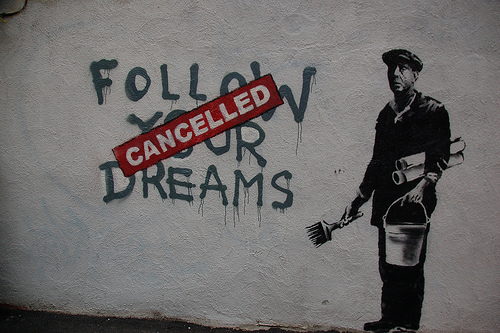
 Some rights reserved by jurvetson
Some rights reserved by jurvetson
Is there an incubator bubble? Perhaps it’s an incubator arms race. When I wrote Incubators, Accelerators, and Ignition in 2009 there were not a lot of Canadian based incubators (the now defunct BootupLabs was the only one listed in the ReadWriteWeb article).
Incubator Index +18
There has been a rise of support for early-stage entrepreneurs across the country. Yesterday’s announcement of GrowLabs in Vancouver along with the launch of Foundery, Multiplicity Accelerator in Toronto, FlightPath in Edmonton, YearOneLabs in Montreal. There are existing players including Extreme Venture Partners, Mantella Venture Partners, Wesley Clover, Innovacorp and Real Ventures/Notman House. The are university incubators like UW Velocity, MEIC, LeadToWin, Ryerson’s DMZ, Next36. There are Communitech, WavefrontAC, CoralCEA, MaRS, NBIF among others.
There are companies like Jet Cooper, Teehan+Lax incubating people and ideas (Rocketr & TweetMag). There are new programs like the Under 20 Thiel Fellows that had 2 Canadian students: Gary Kurek (LinkedIn, @gskurek) & Eden Full (LinkedIn, @roseicollistech).
There is competition from YCombinator, TechStars and 500Startups – Andrey Petrov YC10 (@shazow), BackType YC08 – Christopher Golda (LinkedIn, @golda) & Mike Montano (LinkedIn, @michaelmontano), Rewardli 500Startups- George Favvas (LinkedIn, @georgefavvas) & Jean-Sebastian Boulanger (LinkedIn, @jsboulanger); A Thinking Ape YCW07 – Eric Diep (LinkedIn, @ediep), Kenshi Arasaki (LinkedIn, arasakik) & Wilkins Chung (LinkedIn), InPulse YCW11- Eric Migicovsky (LinkedIn, @ericmigi), Vanilla Forums TechStars09 – Mark O’Sullivan (@navvywavvy) and others.
There has been an explosion of support for existing organizations, there has been a rise of a new breed of incubator/accelerator/catalyst.
How does an entrepreneur evaluate an incubator?



 Some rights reserved by Chris Devers
Some rights reserved by Chris Devers
Do you pick the incubator? Or does the incubator pick you? This is a business decision. It’s somewhere between chosing an investor and a service provider and picking where to go to graduate school. There are implications for incubators about which startups they choose to help. Their reputation, alumni and talent pool are determined by the people they let in.
There is no magic formula and rationalization or justification can make any decision sensible. But when I advise entrepreneurs, I want them to think about:
- Pedigree & Reputation
- What are the exits? Who are the alumni? What do others think about the program? One of the big reasons that YCombinator has become so successful is the success of it’s alumni. It has been reported that the YCombinator portfolio is worth almost $3B. They have an strong history of helping companies succeed like crazy. Think about this in terms of post secondary education. What is your opinion of a computer science graduate from: Carnegie Mellon University, MIT, Stanford, UWaterloo, Slippery Rock University? The quality of the education might not be any different. But you need to consider the external optics of an incubator program, just like you do in picking a school.
- Alumni, Mentors and Advisors
- Who do you have access to? Does the pedigree or alumni network change your access to people? Think about YCombinator grads, they get access to Yuri Milner and Ron Conway and $150,000. That’s something most of us don’t have access to. What doors and connections that aren’t available to you today can be enabled by attending an incubator. Who are the mentors what have they built? For example, look at the great talent behind GrowLab – Debbie Landa (Dealmaker Media), Boris Wertz (Abe Books), Michael Tippett (NowPublic), Leonard Brody (NowPublic) and Jason Bailey (SuperRewards). These are some people with impressive histories of building, promoting, operating and selling startups. You need to think about your vertical, your customers, the connections to potential acquirers, etc. Are the people connected with the incubator beneficial to me.
- Culture
- You need to make sure that the culture is something you can work in. I can only describe the culture of places I’ve seen, but I look at Extreme Venture Partners and Mantella Venture Partners in mentoring, motivating and growing entrepreneurs. What is important to you? I watched the Like A Little video on TechCrunch Cribs, and there is no way I could live through that again. There’s nothing wrong with the culture, it’s amazing (disturbing), but I could not do it because my stage in life just would not allow it. My advice is that you visit the incubator, meet the people that are in residence, ask questions, observe, form an opinion.
- Funding or equity stake
- What do you have to give up? Equity? A board seat? How does it compare to other incubators? How much will you benefit from the network and pedigree, from the connections and mentors? This is a decision about do you believe the costs match the benefits? Do you have to move? How long can you survive on the capital?
- Free stuff
- This is a funny thing. What do you get for participating? SwagBag? Press? Boardroom for customer meetings? Hosting? Design services? Legal services? Templated documents? Do you get to attend StartupSchool? Do you get press coverage at your demo day? Do you get coffee? Dinner every other week. You’re in it to get the best deal to help your startup grow.
Do you need an incubator?
I’m curious about the feelings and opinions about incubators from:
- Scott Pelton (@spelton) – GrowthWorks has previously invested in BootupLabs. Scott has worked with companies from incubators including Bumptop. Does having an incubator change your opinion or evaluation of young companies?
- John Philip Green (@johnphilipgreen) – John has started LearnHub, been part of the early or founding teams of companies in Silicon Valley and now the leadership team at CommunityLend.
- Leila Boujnane (@leilaboujnane) – Leila is a pillar of the community. She is the founder of Idee & TinEye. She advises startups and hosts events like HackDays.
- Ryan Holmes (@invoker) – Ryan is a founder of HootSuite, he is also an advisor at GrowLab. Wasn’t HootSuite incubated at Invoker? What is the role of the incubator or companies in organic growth of new ideas? How should entrepreneurs evaluate an incubator vs being an employee versus something else?
- Evan Prodromou (@evanpro) – Evan is the founder of Status.net and has raised seed money from MontrealStartup and continued to build an amazing product. I’m curious about his opinion on starting in an incubator.
- Patrick Lor – Patrick cohosts DemoCamp in Calgary. He is on the board at Fotolia. He is an active angel investor. To the best of my knowledge outside of his involvement in SIFE he is not affliated with an incubator.
- April Dunford (@rocketwatcher) – April is the best B2B Marketer in the world! I just said it on the Internets so it must be true. April has worked with lots of startups including NexJ and Janna. I wonder what her advice to a startup considering an incubator would be.
- Rob Lewis (@robertslewis) – A drunken rumor says that Rob is starting his own media incubator in Toronto (possibly with ExtremeVP). And since Rob is a W Media Ventures portfolio company, I don’t want to see any puff PR pieces on TechVibes about GrowLab companies.
- Chris Arsenault (@chrisarsenault) – One of the Jacques’ Mafia and an incredible investor. He has portfolio companies like Chango that have been incubated at Mantella VP. Are incubated companies better?
- Danny Robinson (@dannyrobinson) – Now running BCIC and I’m curious at his opinion about what is rising out of the ashes of BootupLabs and his thoughts on the incubator business model.
More importantly, what do you think about this new bumper crop of incubators?
 This July, we’re aiming to have three cars, two passenger cars along with a bar car that we’ll use for our on-train events.
This July, we’re aiming to have three cars, two passenger cars along with a bar car that we’ll use for our on-train events.
